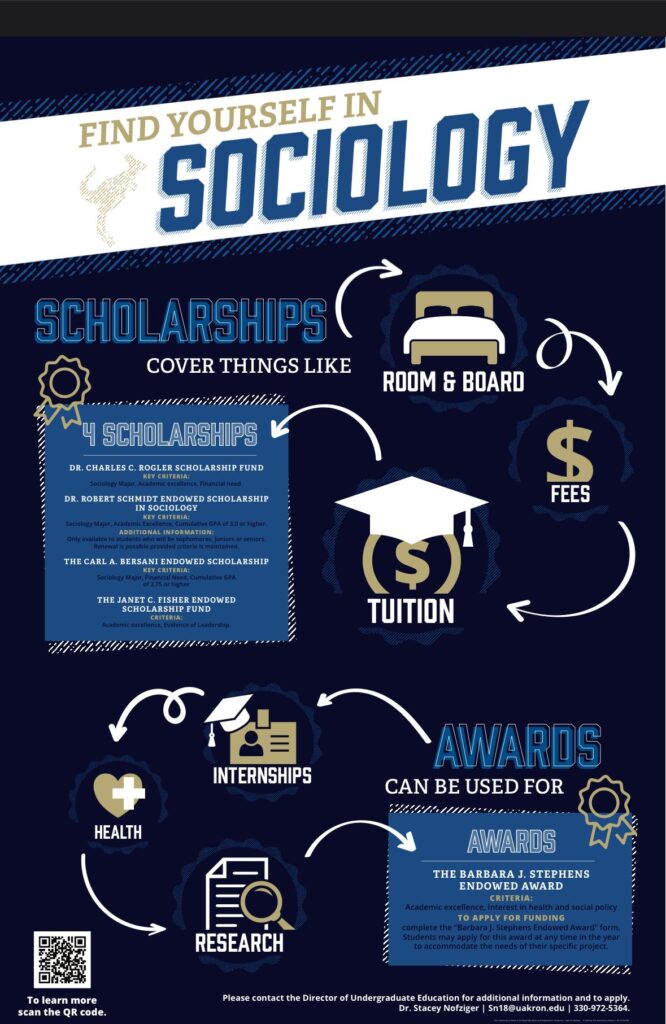The Unspoken Dream: How I Navigated the World of Sociology Scholarships
Hey there! If you’re reading this, chances are you’ve got a spark, a curiosity about the human world, the way societies tick, and the invisible threads that connect us all. You might be dreaming of diving deep into sociology, just like I was. And if you’re anything like me, that dream probably comes with a nagging little worry: how am I going to pay for this?
Trust me, I’ve been there. I remember staring at my laptop screen, the university tuition fees blinking back at me like a giant, unscalable wall. My heart sank a little. But then, a tiny voice inside me whispered, "Don’t give up. There has to be a way." And that, my friends, is how my grand adventure into the world of sociology scholarships began.
My Journey Begins: Discovering the Power of Sociology (and the Price Tag)
Growing up, I was always the one asking "why?" Why do people act the way they do in groups? Why do certain issues persist in our communities? Why do some voices get heard while others are silenced? When I stumbled upon sociology, it was like finding the missing piece of a puzzle I didn’t even know I was solving. It offered frameworks, theories, and a whole new lens to understand the complexities of our shared human experience. I was hooked.
But then came the cold, hard reality check: university isn’t free. My family wasn’t wealthy, and the idea of piling up student loans filled me with dread. It felt like my passion, my calling, was about to be sidelined by financial constraints. For a moment, I considered other paths, "safer" degrees. But the pull of sociology was too strong. I couldn’t let go of the idea of exploring social justice, inequality, and community development. So, I decided to fight for it. My weapon? The internet, a good dose of persistence, and a whole lot of coffee.
The Great Scholarship Hunt: Where I Started (and Almost Gave Up)
Imagine this: you open Google, type "sociology scholarships," and suddenly you’re faced with a seemingly endless, often confusing, list of links. That was me. It felt like trying to find a needle in a haystack, blindfolded. I clicked on random links, got lost in university financial aid pages, and sometimes, honestly, just closed my laptop in frustration.
My initial approach was messy, disorganized, and quite frankly, ineffective. I’d find something, get excited, then realize it wasn’t quite right for me, or the deadline had passed. It was a disheartening cycle. But then, I had an "aha!" moment. This wasn’t just about finding scholarships; it was about strategizing my search. I needed a plan, a map to navigate this daunting labyrinth.
So, what did I do? I started organizing. I created a spreadsheet (yes, a spreadsheet!) with columns for scholarship name, eligibility, deadline, required documents, and a link. This simple step changed everything. It transformed the overwhelming into something manageable.
My Secret Weapons: Categories of Sociology Scholarships I Found
Once I had my system, I realized that sociology scholarships aren’t just one big, amorphous blob. They come in different shapes and sizes, often hiding in plain sight. Here’s how I broke down my search:
-
University-Specific Scholarships: This was my first and most fruitful hunting ground. Almost every university offers its own scholarships. Some are general merit-based awards, but many are specifically for students pursuing certain fields. I dug deep into the "financial aid" and "departmental" sections of my target universities’ websites. I looked for phrases like "sociology department awards," "social sciences grants," or "equity and justice scholarships." Tip: Don’t just look at the main financial aid page. Go directly to the sociology department’s website – they often have unique opportunities!
-
Departmental & Program-Specific Awards: Within the university, the sociology department itself often has dedicated funds for its students. These might be named after past professors, donors, or simply be general support for sociology majors. These are golden because the applicant pool is usually smaller, increasing your chances. I learned to introduce myself to the department administrator or even a professor; they often know about these hidden gems.
-
Professional Organizations & Associations: This was a game-changer. Professional bodies related to sociology and social sciences often have their own scholarship programs to encourage new talent.
- The American Sociological Association (ASA): A big one! They offer various grants and fellowships, especially for graduate students, but sometimes for undergraduates doing research.
- Regional Sociological Associations: Don’t overlook these! Groups like the Eastern Sociological Society or the Pacific Sociological Association often have smaller, but still significant, awards.
- Other Social Science Organizations: Look at groups focused on specific areas of sociology, like criminology, urban studies, demography, or social work. They might have scholarships for students whose work aligns with their mission.
-
General & Merit-Based Scholarships: These aren’t specific to sociology but are open to a wider range of students. Think big scholarship search engines (like Fastweb, Scholarship.com, or even College Board’s scholarship search). The key here is to use very specific keywords in your search: "sociology," "social justice," "community service," "research," "analytical skills," etc. You might find a general scholarship that values the very skills and passions that drew you to sociology.
-
Community & Local Scholarships: Never, ever underestimate these! Your local Rotary Club, Lions Club, women’s groups, ethnic associations, or even your high school alumni association might offer scholarships. The applicant pool for these is often much smaller, making your odds significantly better. These often value community involvement and local impact – areas where sociology students often shine!
-
Specialized Research Grants & Fellowships: As I progressed in my studies, especially into my later undergraduate years and certainly for graduate school, I started looking into grants for specific research projects. If you have a passion for a particular sociological topic (e.g., immigration studies, environmental sociology, social movements), there are often foundations or institutes that fund research in those areas.
Crafting My Story: Making My Application Stand Out
Finding the scholarships was only half the battle. The other, equally crucial part, was making my application shine. I quickly realized that these committees weren’t just looking for good grades; they were looking for a story, a purpose, a future sociologist who would make a difference.
-
The Essay: My Voice, My Passion: This was where I truly connected with the application. Instead of just listing my accomplishments, I wove a narrative. I talked about why sociology mattered to me, how it changed my perspective, and what I hoped to achieve with my degree. I shared personal experiences that sparked my interest in social issues. For example, I wrote about how observing community dynamics in my hometown led me to question underlying social structures, which sociology then helped me understand. I made sure every essay reflected my authentic voice and clearly articulated my passion for the field. Rule of thumb: If you can replace "sociology" with "engineering" and the essay still makes sense, you haven’t made it specific enough!
-
Recommendation Letters: The Power of Others’ Words: I chose professors and mentors who knew me well, not just those with the most impressive titles. I specifically asked people who could speak to my analytical skills, my critical thinking abilities, my dedication to social issues, and my potential as a sociologist. I always provided them with my resume, the scholarship description, and a brief reminder of the work I’d done with them. Make it easy for them to write a strong letter!
-
My Academic Record: Beyond Just Grades: Yes, good grades are important. They show you can handle the academic rigor. But I also highlighted specific sociology courses I excelled in, research projects I participated in, or even interesting papers I’d written. It wasn’t just about the GPA; it was about demonstrating my engagement with the subject matter.
-
Extracurriculars & Volunteer Work: Showing My Commitment: My involvement in a student human rights group, my volunteer work at a local community center, or even my part-time job that involved interacting with diverse groups – these weren’t just hobbies. They were practical applications of my sociological interest. They showed that my passion extended beyond the classroom and into real-world action. I always tied these experiences back to my sociological goals in my essays.
My Top Tips for Your Scholarship Journey (Learned the Hard Way!)
Looking back, here’s the distilled wisdom I wish I’d known from the start:
- Start Early, Seriously Early: Scholarship deadlines creep up fast. Give yourself ample time to research, write, gather recommendations, and proofread.
- Be Organized: That spreadsheet I mentioned? It’s your best friend. Track everything.
- Read Every Single Word of the Instructions: I almost missed out on one scholarship because I didn’t see a tiny note about a specific formatting requirement. Details matter!
- Tailor Each Application: Do not copy-paste. Every scholarship committee wants to feel like you’re speaking directly to them and their mission. Adapt your essay and materials for each opportunity.
- Don’t Be Afraid to Ask for Help: Talk to your academic advisor, professors, or university financial aid office. They are there to guide you and often know about lesser-known opportunities.
- Persistence is Key: You will face rejections. It’s part of the process. Don’t let it discourage you. Each "no" just brings you closer to a "yes."
- Proofread, Proofread, Proofread (and then ask someone else to proofread): A silly typo can make you look less serious. A fresh pair of eyes can catch what yours missed.
Beyond the Money: What Scholarships Really Gave Me
While the financial relief was, of course, immense, the scholarships gave me so much more. They gave me confidence. They affirmed that my passion for sociology was valid and valuable. They connected me to a network of like-minded individuals and institutions who believed in the power of social science. And most importantly, they freed me up to truly immerse myself in my studies, to engage deeply with my research, and to pursue my academic dreams without the constant gnawing worry of tuition fees.
It wasn’t just about getting money; it was about getting the opportunity to fully become the sociologist I was meant to be.
Your Turn: Go Forth and Conquer!
If you’re feeling that same mix of excitement and apprehension about pursuing sociology, please know that financial hurdles are not insurmountable. There are people, organizations, and institutions out there who want to support students like you, students who are driven to understand and improve our complex world.
Start your search today. Be organized. Tell your story with passion and authenticity. Don’t give up. Your journey into the fascinating world of sociology is waiting, and with a little determination, a scholarship can be the bridge that takes you there. You’ve got this!



